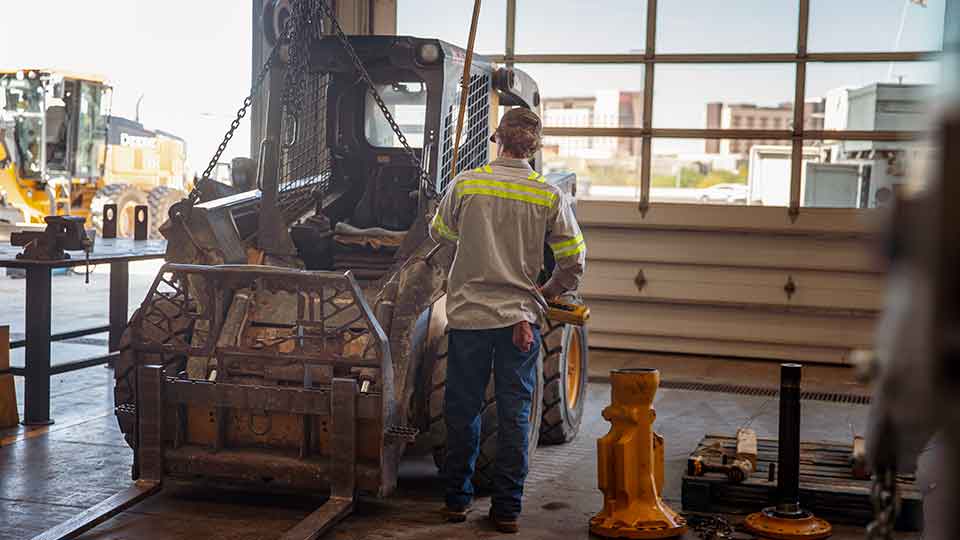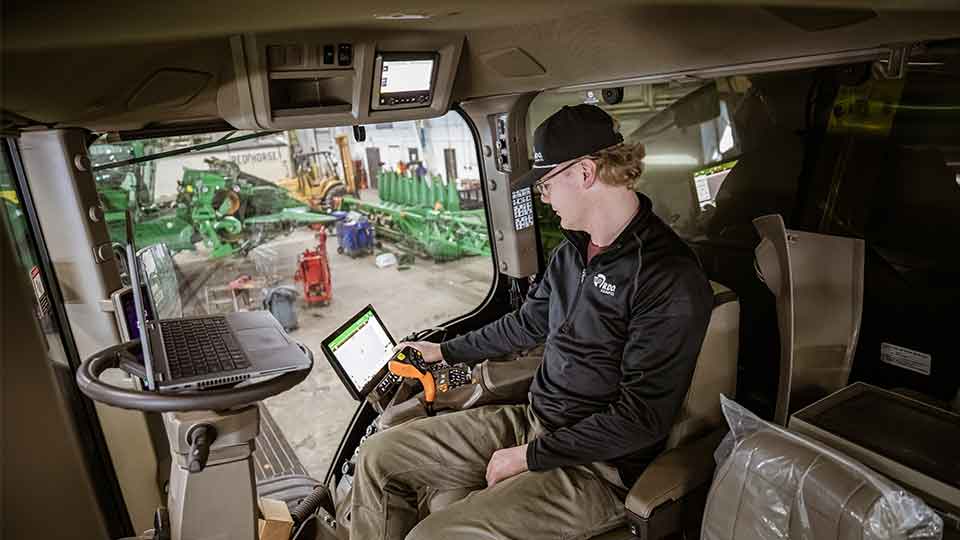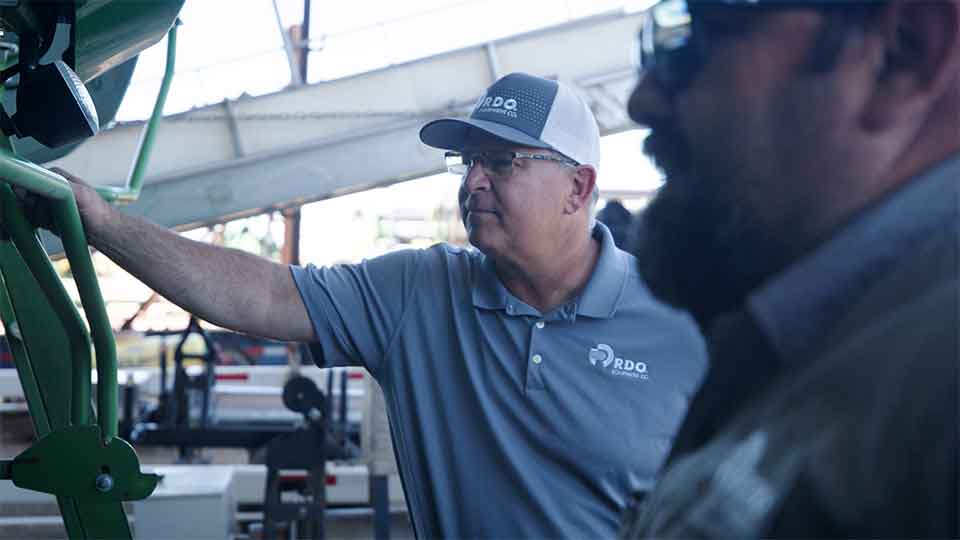
According to the Bureau of Labor Statistics (BLS), there are more than 250,000 heavy equipment service technician jobs in the U.S. (as of 2023). Over the next 10 years, the industry is expected to add around 20,000 jobs, bringing this total higher.
This is great news for heavy equipment mechanics, especially those looking to enter the industry. That said, while more jobs means more opportunities for everyone, it can also make moving between them more enticing.
Which might not always be the best decision.
Although there are 250,000 jobs, the heavy equipment technician profession is still relatively small. For comparison, there are roughly 800,000 auto mechanic jobs in the U.S.
Since you work in a specialized field, the demand for your services is high.
Signing bonuses and raises can tempt technicians to move jobs frequently.
But how often should you change jobs, and what are the downsides of leaving too often? Does it make sense to change employers consistently, or will this hurt you in the long run?
Here at RDO, we employ heavy equipment service technicians (1,000+) in more than 80 locations across 12 states. In this article, we’ll lay out the pros and cons of jumping from one job to another quickly so you can structure your career in the best possible way.
If you’re unhappy at work and it’s not getting better, it’s okay to leave.
Life is about more than work; you shouldn’t have to work somewhere where you’re uncomfortable, or don’t feel valued.
In fact, there are more than a few situations where switching jobs as a mechanic probably makes sense.
Changing jobs to take advantage of another company’s signing bonus, for a bump in your pay or more overtime opportunities won’t hurt you.
It’s developing a pattern of jumping between companies that you might want to avoid. For this article, we’ll define job hopping as consistently working at more than one company per year.
For example, starting the year at one company, leaving six months later, and only spending eight months at the company you left for is job hopping.
Let’s talk about the advantages and disadvantages of doing this.

Switching jobs can often be a good thing. A fresh start at a company that’s excited to have you can do wonders for your career — there’s always the chance you’ll love your new employer and it will be a perfect match.
Here are some other advantages of job hopping (and common reasons why mechanics do it).
Moving between jobs every once in a while can be a good way to increase your pay. Zippia reports on average, when changing jobs, you can increase your wage by 5.8 percent.
Moving from one job to another, to either a larger, more resourced company or to a more senior role, will help you increase your pay. This might happen faster than it would have if you had stayed with your current employer.
Although some companies (RDO included), evaluate their diesel mechanic pay on a quarterly or bi-yearly basis, these raises rarely compete with what you could get by changing companies.
There’s value in seeing how different companies operate. While your work may be largely the same from one situation to the next, your environment might not.
Some companies might have additional resources to help you work, more amenities, updated facilities or a better culture for you.
Job hopping lets you explore all of these things (and more), giving you perspective on what’s out there. This can help you learn what you value most in an employer.
If you’re looking to change jobs to progress in your career, this could happen. It’s not uncommon for a technician to leave a company pursuing a more senior role.
Advancement opportunities are among the primary reasons people leave their jobs — heavy equipment mechanics included.
While job hopping will only get you so far, there is an opportunity for career advancement.

Another upside of moving between companies is the opportunity to expand your skill set. As a heavy equipment mechanic, you can work on all kinds of machinery. Industries like forestry, mining, transportation, agriculture and construction depend on your capabilities.
Within these industries, there are hundreds of products from many major manufacturers.
By changing companies (and industries), you’ll get to learn and work on new machinery. Consistently learning new systems and products keeps you sharp and engaged at work and moving forward, which can be a long-term positive.
Beyond the skills and experience you’ll gain, the people you meet when changing companies can be beneficial.
A strong network can be wonderful for your career. Word of mouth and employee referrals are a driving force in this profession. Building connections with people at multiple companies could pay dividends for you as they can advocate for you and provide future opportunities.
This is an upside of hopping jobs.
Changing jobs is always interesting. In some ways, it’s a risk that might make you nervous because you want everything to work out. On the other hand, a new opportunity can feel like a breath of fresh air, reinvigorating your career and helping you advance.
For all of the great things we listed above, changing jobs has disadvantages, especially if you’re hopping between them regularly.
At a certain point, changing jobs too often can hurt your future job prospects. When evaluating hires, companies look at a candidate’s full picture. This includes their skills, references, interviews and work history.
When a technician’s resume shows instability, this will weigh into their decision.
While this won’t necessarily happen if you’ve left a couple of jobs in the span of a few years, be prepared to answer questions about your previous employment.
Finding, selecting and onboarding new employees is expensive and difficult. As a result, businesses want to avoid doing it more often than necessary.
Getting a newly-hired heavy equipment technician up to speed and trained is especially challenging.
That’s why if you have been regularly hopping between jobs, this can be a red flag, and you should expect to be asked about it.
Related: 11 Common Diesel Mechanic Job Interview Questions
Another downside of job hopping is that you don’t lay down roots anywhere for too long. In the long run, this can impact your opportunities to advance into leadership and management roles at a company.
If this is a goal you have, you should consider the long-term payout of staying with a company and creating a healthy track record of success and reliability.
Today, it’s estimated that (across the U.S.) around 60 percent of management hires are through internal promotions. So, while it’s not impossible to achieve these kinds of goals by changing jobs, consistent job hopping won’t help you.

This third disadvantage applies to everyone — not just heavy equipment professionals. Changing jobs can be a stressful process. Sure, there are potential upsides, but there’s no denying that moving between companies can create mental fatigue and job jitters. It’s also more challenging to balance the other things in your life when moving positions.
Doing this too often (more than once per year) can be bad for your mental or physical health and might take a toll on other aspects of your life.
There are also financial disadvantages to being a job hopper. As a diesel mechanic, you make a strong living. In 2025, these wages will likely continue to rise across the board.
Many companies also offer tax-advantaged accounts like 401ks, which are great ways to save for retirement. With these accounts, your employer may offer a company match, putting in as much money as you do up to a certain percentage of your paycheck.
Over time, as you and your employer contribute each pay period (and your wages rise), these retirement savings can grow substantially.
However, this is where job hopping comes into play. Usually, your company’s contribution to your 401k only becomes yours in phases — based on years of service.
For example, if you and your company each contribute $1,000, you might only get to access $200 (20%) of their contribution after your first year, $400 (40%) after your second year and so on.
Leaving a job will impact how much of your retirement is vested.
While this isn’t necessarily a good reason to leave a job you don’t like, moving between jobs consistently makes it difficult to take advantage of your employer's contributions.
Benefits like health, dental, and vision insurance are another consideration.
These coverages may differ from one company to another, causing you to establish new provider relationships or cover coverage lapses between companies.
At the end of the day, your career journey is up to you. Don’t get us wrong, as a heavy equipment mechanic, changing jobs isn’t a bad thing. There are several upsides to moving on from a company that’s not a good fit.
The trick is to find an employer you love.
Your next step is to read How to Choose a Company to Work For as a Diesel Technician (7 Tips).
In that article, Shawna shares some tips for finding and selecting a company to help you build the heavy equipment technician career you’re proud of.
If you’re looking for a company where you can lean into your passions, build a great career and thrive as a technician, consider RDO.
We employ more than 1,000 full-time service technicians across our organization — from California to Minnesota.
In these roles, you’ll receive full benefits, training and development, tool allowances, paid time off, career pathing and profit sharing.
Find an open position in your area.
If you’re not ready to apply but want to do a bit more research, check out our service technician careers page for more information.